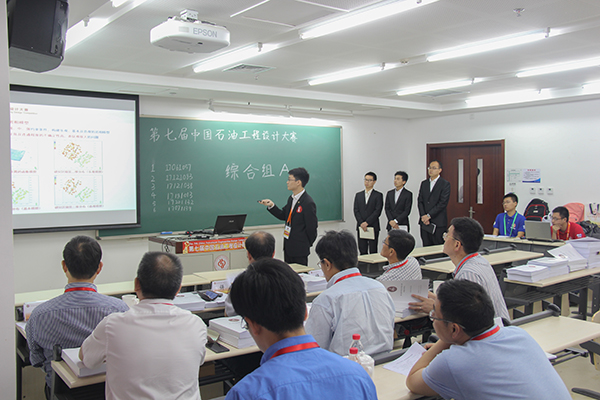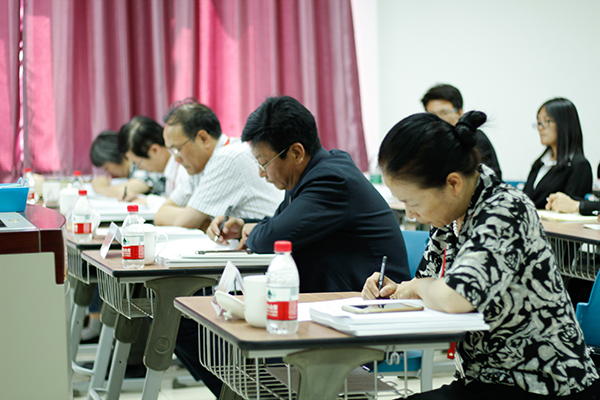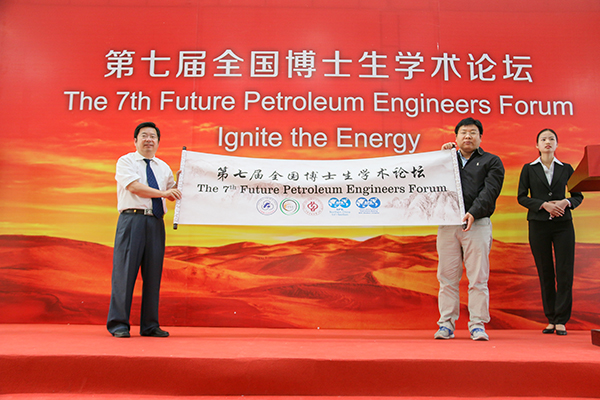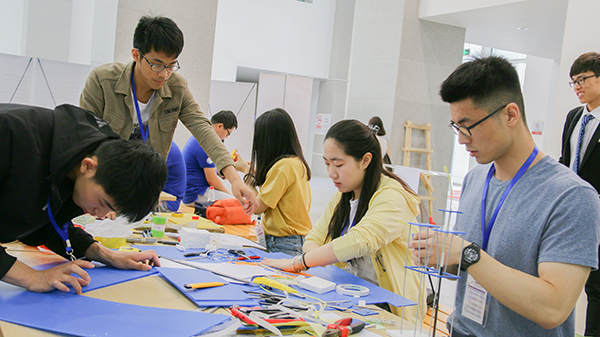Li Lizhe, a freshman at China University of Petroleum-Beijing (CUPB), usually sleeps in late during weekends as she has no morning classes, but that was not the case this particular Saturday. At 6:30, she bounced from her bed, quickly washed, dressed up in a blue shirt and hurried to No 4 teaching building.
There, on the first and second floor, the final round of the 7th China Petroleum Engineering Design Competition was commencing at exactly eight o'clock and Li, as a volunteer for the event, stood guard at the door of one of the competition rooms and helped the contestants and judges to sign in.
Li was one of over one hundred volunteers selected for the competition and was assigned to the second team of the reception group.
"The competition teams are wonderful and there are times when I can hardly follow their ideas," said Li.
Competition for petroleum field innovation
This year, 2,259 teams from 58 universities and research institutions from home and abroad registered for the competition, submitting a total of 1,161 designs. After two rounds of competition, 62 teams made it to the final in Beijing.
"We invited professionals from petroleum enterprises and research institutions to be the judges this year," said Professor Liang Yongtu of the CUPB, the initiator of the competition, adding "As a national leading competition for students of petroleum engineering, innovation is what we pay special attention to."
"There are already so many competitions for college students in China, but I just wanted one that was really suitable for the students of petroleum engineering," explained Liang in commenting on what makes the competition unique and important.
Since it was launched in 2010, the competition has grown in influence and significance, and it continues to do so, getting bigger each year.

A team showcases their design at the 7th China Petroleum Engineering Design Competition on May 13 at China University of Petroleum-Beijing. [Photo/provided to chinadaily.com.cn]
Yao Li, a team coach from the School of Petroleum Engineering, Southwest Petroleum University, said that 15 teams from his school made it to the final round this year.
"From the first competition to the seventh one, we have consecutively joined all the events," said Yao, who added that students learn both knowledge and practical skills from the competition.
"There was one student from my school who joined the competition as an undergraduate, and when he joined the event for the fifth time, he was already a Ph.D. student," said Yao.
Hands-on experience is vital
Three male college students from a university nearby were nearly successful in peeping in through the glass doors at the back of the competition room.
"We came to learn their ideas because last year we joined the competition but our performance was not satisfactory," said one student.
"And we want to do better teamwork next year," added another.
Participants can not only learn about teamwork but also gain hands-on experience, especially in the research period.
"This year, most of the design projects are relatively completed and we can see that all the teams are fully prepared," said Judge Fan Yuxin from the Xinjiang oilfield branch of the China National Petroleum Corporation.
"But some teams are weak in connecting their knowledge from books to real practices, and some lack in-depth field research," said Judge Li Jiexun from the Daqing oilfield branch of the China National Petroleum Corporation.

Judges take notes on the designs during the 7th China Petroleum Engineering Design Competition. [Photo/provided to chinadaily.com.cn]
Over the tea break, many competitors surrounded Judge Zhou Yueyun, vice-head of the Drilling Research Institute of Sinopec's Southwest Petroleum Engineering Company. They asked about their performance and if he could give them any advice.
"Many teams show great academic foundations but sometimes their research is not cost-effective," explained Zhou. As an engineer, Zhou said he cares a lot about practical demand in oil exploitation.
"Sometimes, it's not the tech-savvy designs that count, but the cost-effective ones," added Zhou.
Platform for national initiate
The 7th China Petroleum Engineering Design Competition is made up of a series of activities, including the 7th Future Petroleum Engineers Forum Enterprise Exhibition, the Offshore Drilling Platform Design Competition of the National University and the Middle School Student 6th Marine Culture Design Contest.

The opening ceremony of the 7th Future Petroleum Engineers Forum is held on May 13 at China University of Petroleum-Beijing. [Photo/provided to chinadaily.com.cn]
Several domestic and foreign petroleum companies -- including ConocoPhillips, Saudi Aramco Beijing Research Center, and Schlumberger -- were invited to the forum.
"At the enterprise exhibition, we offer students and companies a good opportunity to communicate face to face," said Fang Baihui, counselor of Petroleum Engineering College, CUPB, who's in charge of the exhibition.
"Last year, students sent at least 400 resumes at the exhibition, and over 20 of them were chosen as interns," said Fang. "I hope the small booths can attract students and show the culture of different companies."
The exhibition can also help students network in the industry, explained Fang, which she said is important for working prospects.

Students work in the offshore drilling platform design competition. [Photo/provided to chinadaily.com.cn]
This year, the enterprise exhibition covers various continents and students from developed foreign countries -- such as Canada, Russia and Mexico – are taking part in it.
Many students are from countries along the Belt and Road, said Fang.
"They told me that they know something about the Belt and Road Initiative proposed by China," said Fang with delight. "The competition as a whole is a good platform for our university and for our country."